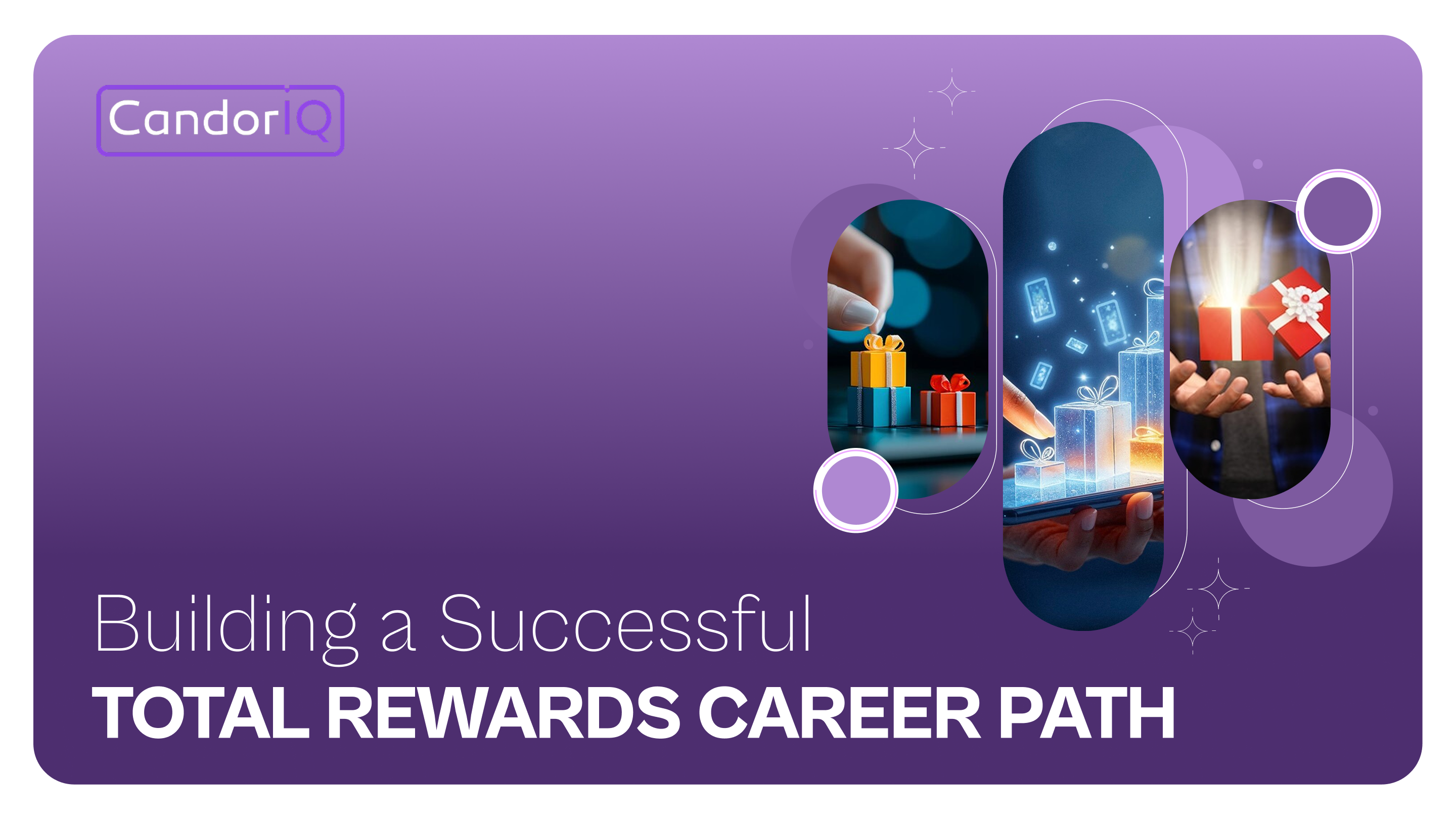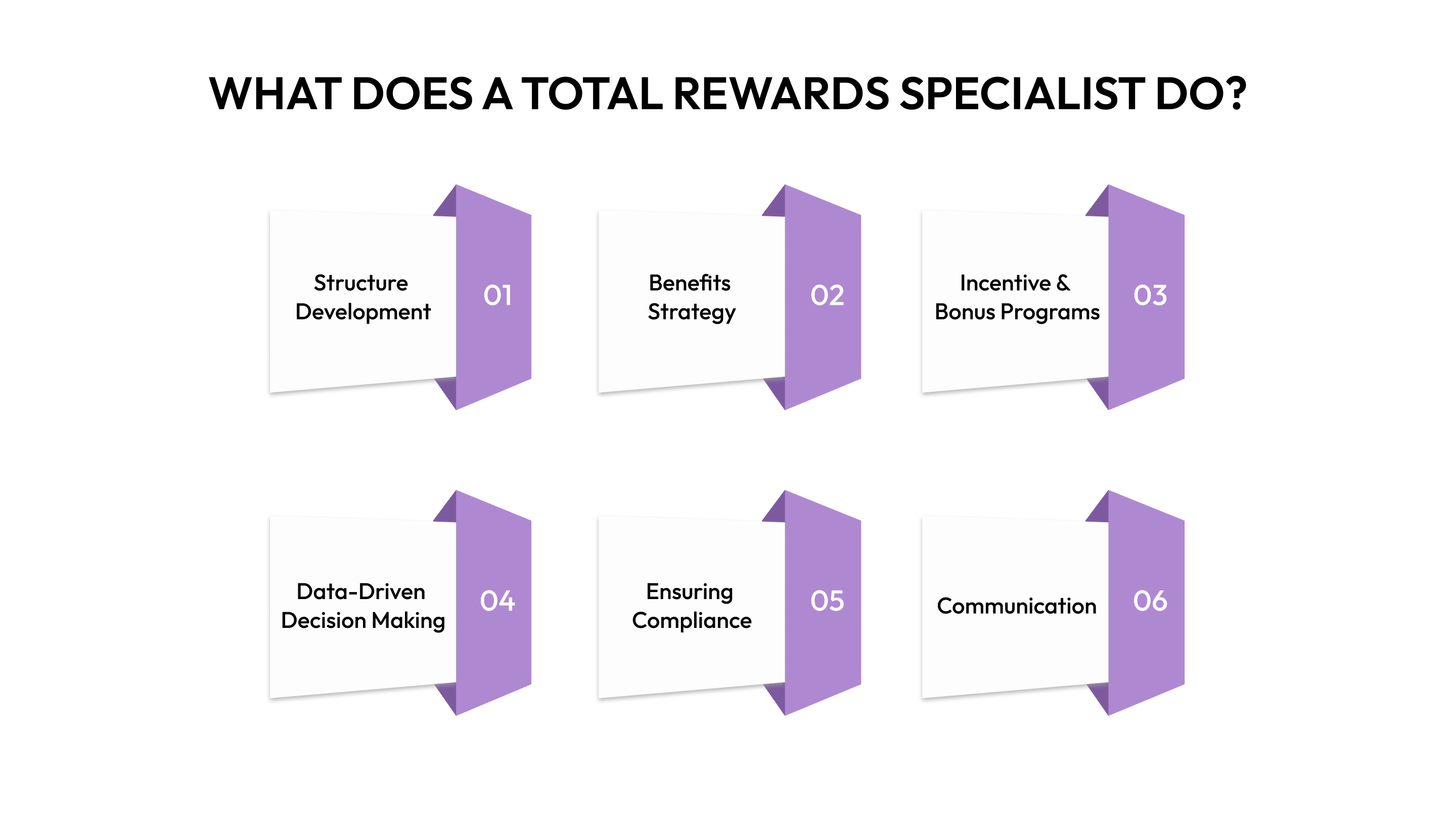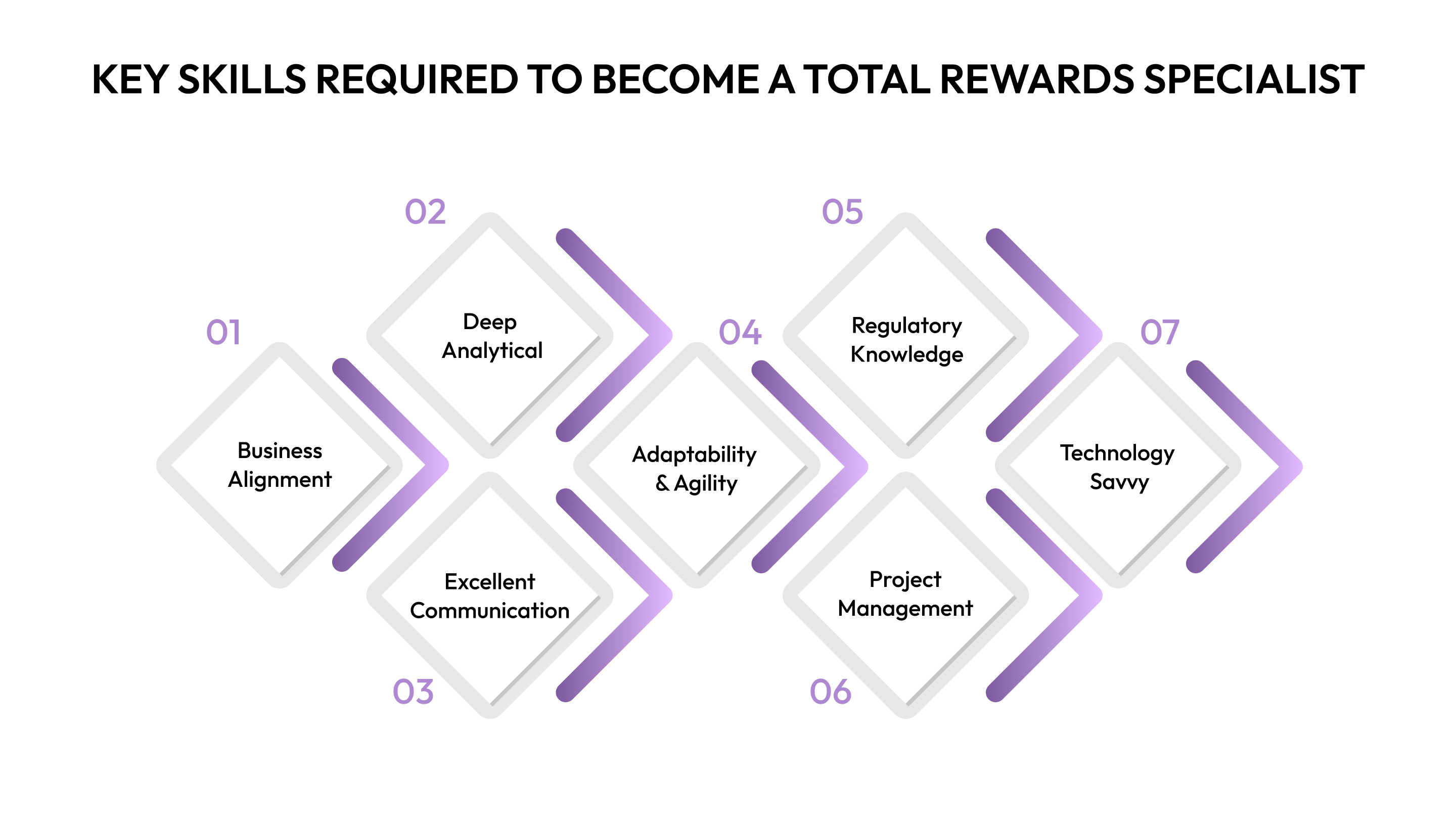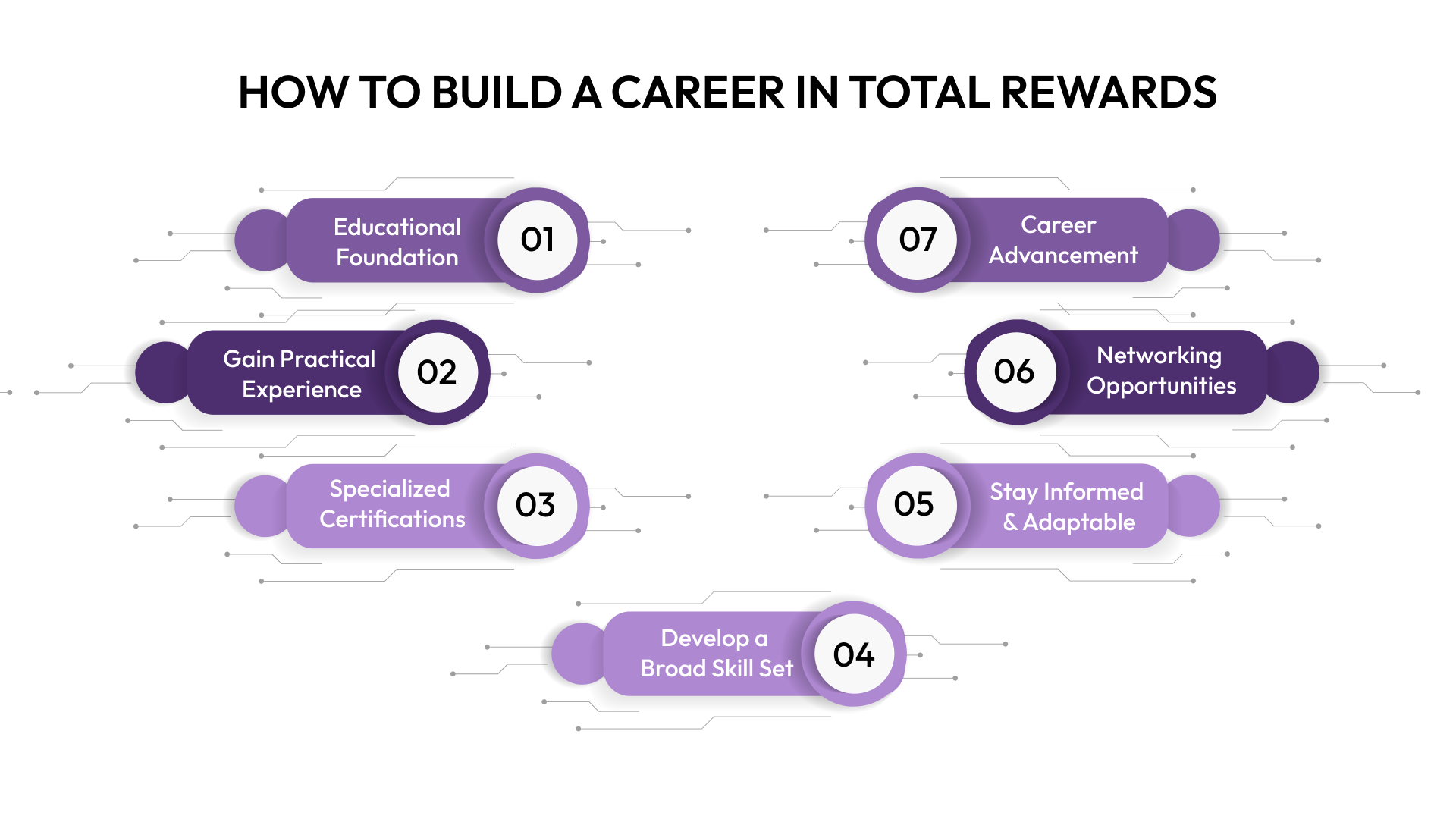Building a Successful Total Rewards Career Path
Start your Total Rewards career path by mastering analytics, strategic thinking, and certifications. Drive talent retention. Explore your future now!

When most people think of a career in Human Resources (HR), they often gravitate towards roles in Learning and Development, Recruitment, or Diversity, Equity, and Inclusion. These areas tend to grab the spotlight, with clearly defined paths and high visibility. But there’s one aspect of HR that doesn’t always get the attention it deserves: Total Rewards.
The truth is, many professionals simply don’t know much about the world of Compensation and Benefits, or Total Rewards, because these roles aren't always emphasized in traditional HR education or industry conversations. But for professionals who thrive on data and have an interest in balancing business goals with employee satisfaction, a career in Total Rewards can be incredibly fulfilling. It’s a field where analytical skills meet strategic decision-making, and the impact on company success is measurable and immediate.
In this blog, we’ll break down how to build a successful career in Total Rewards, covering the skills, strategies, and opportunities that make this path a game-changer for both HR professionals and the businesses they support.
Key Takeaways
- A career in Total Rewards combines strategic thinking, data analysis, and an understanding of human behavior.
- Total Rewards specialists are responsible for designing, managing, and optimizing compensation and benefits programs that align with company goals while meeting employee needs.
- The key skills required for a career in Total Rewards include a deep understanding of compensation, benefits strategy, and legal compliance.
- Certifications and a solid educational foundation in HR and business administration are essential to build credibility and expertise in the field.
- As businesses evolve and employee expectations shift, professionals in Total Rewards must stay informed about industry trends, adjust strategies accordingly.
What are Total Rewards?
Total Rewards is an all encompassing approach to compensation and employee benefits that goes beyond salary. It encompasses all the financial, non-financial, and intangible rewards that a company offers to its employees in exchange for their skills, dedication, and effort.
Total Rewards typically includes:
- Compensation: Direct financial rewards, such as base salary, bonuses, and incentives.
- Benefits: Indirect rewards, such as health insurance, retirement plans, wellness programs, and paid time off.
- Work-Life Balance: Policies that promote flexibility, such as remote work, flexible hours, and parental leave.
- Recognition: Programs that reward employee achievements, such as awards, bonuses, and public acknowledgment.
A strong Total Rewards program helps ensure that employees are not only fairly compensated for their work but also feel valued and supported, fostering long-term engagement and satisfaction.
Why a Career Path in Total Rewards is Worth Pursuing

- High Demand in Today’s Market: Companies are increasingly focusing on Total Rewards as a key strategy for talent retention and attraction. The growing complexity of compensation packages means there’s an immense requirement for professionals who can manage these strategies effectively.
- Diverse Skillset Development: A career in Total Rewards offers a broad range of skills, from data analytics and market research to employee engagement and policy development. Professionals in this field are exposed to both the financial and human sides of the business, providing a well-rounded expertise.
- Strategic Impact: Professionals in Total Rewards play a critical role in shaping company culture, aligning compensation with business goals, and fostering employee satisfaction. Your work directly influences an organization’s ability to attract, motivate, and retain top talent.
- Lucrative Compensation: As Total Rewards specialists work at the intersection of HR, finance, and strategy, they are highly valued and compensated. The role also offers opportunities for upward mobility into senior leadership positions, including Chief Human Resources Officer (CHRO).
- Job Satisfaction and Impact: Helping employees understand and appreciate their total compensation package fosters trust and engagement. Being part of a strategy that enhances employee well-being and drives organizational success provides a strong sense of accomplishment.
Suggested read: How to Strengthen Your Employee Value Proposition and Total Rewards
.png)
To truly grasp the opportunities in this field, it's important to understand the day-to-day responsibilities of a Total Rewards Specialist. Let’s break down the key tasks and roles they perform.
What Does a Total Rewards Specialist Do?

A Total Rewards Specialist is responsible for developing, implementing, and maintaining the company’s compensation and benefits programs in a way that aligns with both organizational goals and employee needs.
Their role has become increasingly critical as companies look to create comprehensive packages that not only attract top talent but keep them engaged for the long term. Let’s break down the key responsibilities:
- Compensation Structure Development: A key aspect of the job involves creating and maintaining competitive salary structures, ensuring that pay is equitable both internally and in comparison to the market. A Total Rewards Specialist will use data-driven insights to establish pay grades, salary bands, and performance-based bonuses that drive both employee satisfaction and business success.
- Benefits Strategy: Managing a benefits portfolio goes beyond choosing health insurance plans or 401(k) options. It’s about understanding what employees value and what’s feasible for the organization. From health benefits to wellness programs, a Total Rewards Specialist designs benefits packages that not only meet regulatory requirements but also make employees feel supported.
- Incentive and Bonus Programs: The specialist works with leadership to design short-term and long-term incentive programs (like annual bonuses, stock options, and profit sharing). The aim is to reward employees for their hard work in a way that aligns with the company’s financial goals and values. A Total Rewards Specialist ensures that the incentive plans are structured in a way that maximizes employee motivation while being sustainable for the business.
- Data-Driven Decision Making: The role requires deep analytical skills to measure the effectiveness of compensation and benefits programs. By analyzing compensation trends, employee satisfaction surveys, and turnover rates, the Total Rewards Specialist can make informed decisions about how to evolve the reward strategy to meet both business needs and employee expectations.
- Ensuring Compliance and Governance: In a world where labor laws and regulations are constantly changing, the Total Rewards Specialist ensures that the company’s programs are compliant with both local and global regulations. They work to avoid any legal pitfalls by keeping up with the latest policies and implementing any necessary changes to the company's reward programs.
- Communication: Perhaps one of the most underrated aspects of the role is the ability to clearly communicate the value of the total rewards program to employees. The specialist ensures that employees not only understand their total compensation package but can also see how it ties into their performance and career growth.
In a nutshell, it’s a role that blends strategy, data, and empathy—critical for companies looking to engage and retain their workforce effectively.
As we explore the skills necessary for success in Total Rewards, we can see that it's not just about managing benefits but also about strategic thinking and adaptability. Let’s look at the skills that define a successful Total Rewards specialist.
Key Skills Required to Become a Total Rewards Specialist

Becoming a Total Rewards Specialist is not about following a rigid formula or executing a standard set of tasks. This role needs someone who can balance technical knowledge with emotional intelligence, someone who can understand complex data while also considering the human side of compensation. Let’s break down the key skills that define an expert in Total Rewards:
- Strategic Thinking and Business Alignment: A Total Rewards Specialist is, at their core, a strategic thinker. They need to be able to identify how every compensation decision ties into broader business objectives, whether it’s driving profitability, talent acquisition, or retention.
- Deep Analytical and Data Interpretation Skills: Total Rewards Specialists must be comfortable with numbers, but more importantly, they must know how to interpret and apply that data strategically. They analyze compensation surveys, pay equity reports, and workforce data to inform decisions. This skill involves digging into the details to uncover trends and opportunities for optimization.
- Excellent Communication and Interpersonal Skills: While the role involves technical work, Total Rewards Specialists must also be strong communicators. Their role often includes educating employees about the value of their compensation packages, and that requires making difficult-to-understand benefits or salary adjustments feel relatable and understandable.
- A High Level of Adaptability and Agility: Compensation and benefits are constantly evolving due to a variety of reasons. A Total Rewards Specialist must be adaptable, able to pivot when necessary to keep up with these changes. As companies scale or introduce new roles, their compensation plans must evolve as well.
- Mastery of Legal Compliance and Regulatory Knowledge: Total Rewards Specialists must have in-depth knowledge of labor laws, tax regulations, and compensation-related compliance standards. This includes ensuring that their organization adheres to rules such as the Affordable Care Act, Fair Labor Standards Act, and other local, state, and federal laws.
- Project Management and Organizational Skills: Total Rewards Specialists need strong project management skills to coordinate multiple moving parts, from annual performance reviews to benefits enrollment periods. They must keep track of deadlines, budgets, and stakeholders to ensure that all programs are rolled out effectively and on time.
- Technology Savvy and HRIS Expertise: Today’s Total Rewards programs rely heavily on HR software, from compensation management platforms to benefits administration systems. They should have a strong understanding of HRIS (Human Resource Information Systems) to make the most of these platforms and use them to manage and optimize compensation and benefits.
With the skills and knowledge laid out, it’s time to turn our attention to the steps you can take to build a successful career in this field. From education to experience, here's how to get started.
How to Build a Career in Total Rewards

Embarking on a career in Total Rewards is a strategic move into a field that sits at the intersection of data, human behavior, and organizational success. Let's trace through the career path:
- Start with a Solid Educational Foundation: A bachelor's degree in human resources, business administration, or a related field is typically the starting point. Courses in finance, accounting, psychology, and industrial relations provide the foundational knowledge needed for understanding the complexities of compensation and benefits. For those aiming to advance, pursuing a master's degree or specialized certifications can further enhance expertise and career prospects.
- Gain Practical Experience in Related HR Functions: Experience in roles such as HR generalist, payroll coordinator, or benefits administrator can provide valuable insights into the operational aspects of HR. These positions allow individuals to develop a deep understanding of employee needs and organizational objectives, which is crucial for designing effective Total Rewards strategies.
- Pursue Specialized Certifications: Certifications can demonstrate a dedication to the field and a deeper understanding of Total Rewards principles. Programs offered by organizations like WorldatWork and the International Foundation of Employee Benefit Plans (IFEBP) cover topics such as compensation analysis, benefits design, and strategic reward management.
- Develop a Broad Skill Set: Successful Total Rewards professionals possess a combination of analytical, strategic, and interpersonal skills. Proficiency in data analysis and HR technology is essential for evaluating compensation trends and measuring program effectiveness. Additionally, strong communication skills facilitate collaboration with leadership and effectively convey the value of Total Rewards initiatives to employees.
- Stay Informed and Adaptable: The landscape of Total Rewards is continually evolving, influenced by factors such as economic shifts, regulatory changes, and emerging employee expectations. Staying informed about trends and being adaptable to change are key to maintaining the relevance and effectiveness of Total Rewards programs.
- Seek Mentorship and Networking Opportunities: Connecting with professionals in the field can provide valuable guidance and insights. Participating in industry conferences, joining professional organizations, and seeking mentorship opportunities can facilitate career growth and development.
- Aim for Career Advancement: As you gain experience and expertise, opportunities for advancement become available. Progression in the Total Rewards field can lead to roles such as Senior Compensation Analyst, Total Rewards Manager, and eventually Director or VP of Total Rewards. These positions involve strategic planning, leadership, and a broader impact on organizational success.
Also read: Creating a Total Rewards Strategy for a Multigenerational Workforce

Building a career in Total Rewards is a journey that combines analytical prowess with a genuine interest in enhancing the employee experience. By being committed to continuous learning and adaptation, individuals can position themselves for success in this impactful and rewarding field.
Conclusion
By strategically designing and managing your Total Rewards program, you create an environment where employees feel truly valued, and the business can maximize its potential for growth. Whether you're focused on improving retention, boosting productivity, or enhancing your employer brand, a well-executed Total Rewards strategy can be a significant lever for success.
At CandorIQ, we help organizations fine-tune their Total Rewards strategies with data-driven insights that align compensation and benefits with business goals. Our platform enables seamless management of compensation cycles, transparent reward distribution, and actionable insights to ensure fair and competitive pay practices across the organization.
Ready to optimize your Total Rewards strategy? Book a demo with CandorIQ today to discover how our platform can help you create a rewards program that drives both employee satisfaction and business success.
FAQs
1. How do changes in the economy impact Total Rewards strategies?
Economic shifts, like inflation or market downturns, often lead to adjustments in compensation structures and benefits offerings to ensure competitiveness and retain talent during challenging times.
2. What’s the difference between Total Rewards and traditional compensation management?
Total Rewards encompasses not just salary but a holistic approach that includes benefits, career development, recognition, and work-life balance, whereas traditional compensation often focuses solely on base pay and bonuses.
3. How does Total Rewards help companies stay competitive in talent acquisition?
A robust Total Rewards strategy attracts top talent by offering competitive compensation packages, personalized benefits, and growth opportunities, making the organization stand out in a competitive job market.
4. What are some common challenges faced when designing a Total Rewards program?
Balancing internal equity with external market competitiveness, ensuring benefits meet diverse employee needs, and maintaining transparency while keeping the program within budget are some common challenges faced by organizations.
5. How can a company measure the success of its Total Rewards program?
Success can be measured by tracking key metrics like employee satisfaction, retention rates, performance outcomes, and the effectiveness of various reward elements through surveys and analytics.
Ready modernize your workforce and compensation strategy?
See how CandorIQ brings workforce planning and compensation together with AI.


